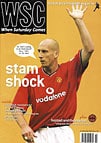 Anyone making rash predictions about the internet risks looking silly. So to avoid that possibility we asked four people invovled in football websites to do it for us
Anyone making rash predictions about the internet risks looking silly. So to avoid that possibility we asked four people invovled in football websites to do it for us
1. What has been good about football on the web so far?
AP: The original philosophy behind the internet was to open up a brave new world of communication. It’s fallen short of that, but in the case of football, there has at least been an extension of the supporter’s voice and the principle that first inspired fanzines.
PC: It has got the readers so much more involved than they have been before, outside fanzines – but websites reach far more people, far more often. We publish as much as 3,000 words of letters a day. You can look at the readership figures for different sections, too, and assess what works and what doesn’t in an objective way rather than on a hunch. Statistics are a lot faster and more user friendly. Oh, and it’s great to buy match tickets, especially for games abroad.
UHL: The availability of information. Looking for simple but obscure things concerning foreign countries was a major undertaking five years ago, but it often takes less than a minute today. And there really is such a thing as a, whisper the now-dreaded word, “community”. I have never been in touch with so many football fans from so many different places. And there really are communities that are not being spoon-fed and/or directed by the clubs.
BL: Fans can get news on teams they follow without needing to live in that country or learn another language; and those who travel to games can find out how to get tickets and where to stay. Football is global and the web allows the insularity of the mainstream English media to be ignored.